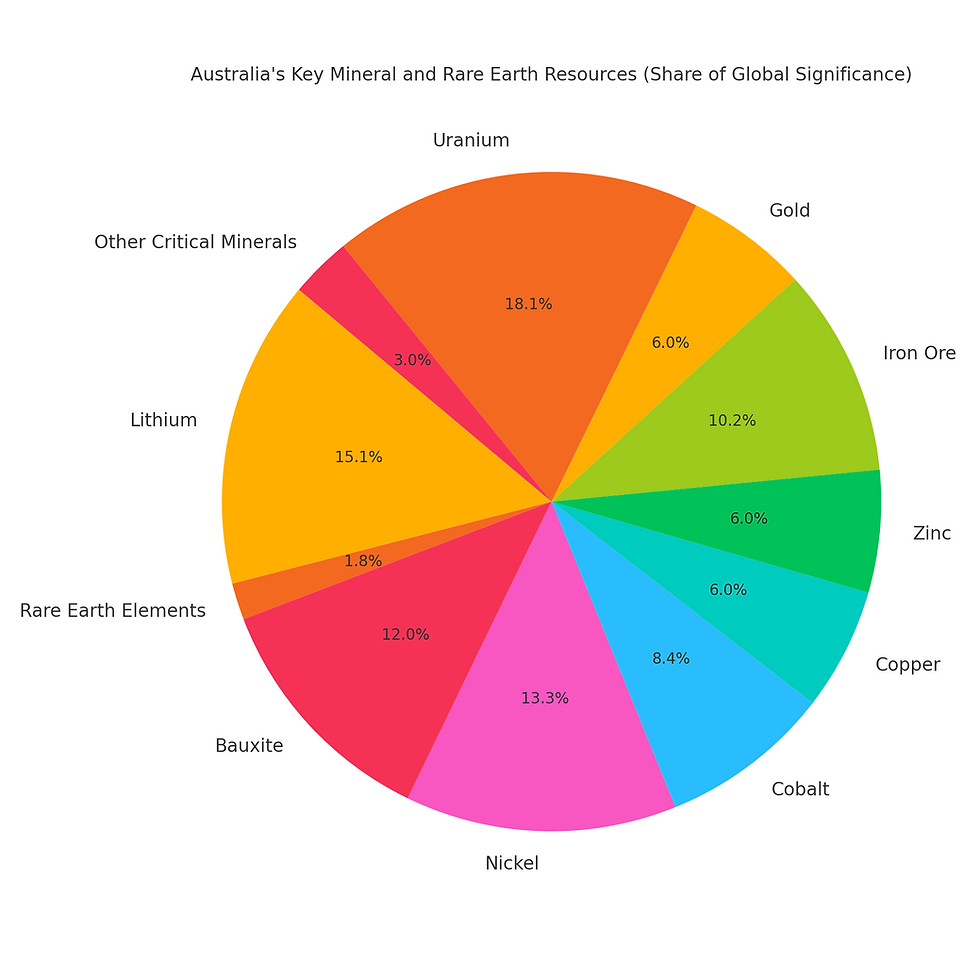Unlocking Australia's Resource Potential for a Sustainable and Prosperous Future - time to seize the moment
- helenfielder
- Jul 5, 2025
- 3 min read
Australia is endowed with an abundance of natural resources, positioning the nation as a key player in the global economy. As we navigate the complexities of international trade, it is essential to focus on how we can leverage our rich resource base to benefit all Australians while fostering positive relationships with our trading partners.
Australia is one of the world's leading producers of critical minerals, including lithium, cobalt, and rare earth elements as illustrated in the diagram below. These resources are vital for the transition to renewable energy and the development of advanced technologies. By investing in the domestic processing and refining of these materials, Australia can create jobs, stimulate economic growth, and enhance our position in global supply chains.

The growing demand for resilient and ethical supply chains, especially in light of geopolitical tensions, puts Australia in a prime position. Countries and corporations are seeking alternatives to dominant suppliers, particularly China, which currently refines nearly 70% of the European Union’s critical minerals.[1] As noted in a recent European policy review, this dependence risks making the EU “a province of China” when it comes to mineral supply chains.[2]
The upcoming BRICS meeting on rare earths and critical minerals in Rio de Janeiro (6–7 July 2025) represents a pivotal moment. While the BRICS bloc seeks to build stronger South-South cooperation and reduce Western control over supply chains,[3] Australia has the opportunity to engage constructively, either as a neutral observer or strategic partner.
This forum provides Australia with a chance to:
strengthen bilateral agreements with key emerging economies like India, Brazil, and South Africa.
promote co-investment opportunities in mineral processing and clean technology transfer.
establish Australia as a preferred supplier of ethically sourced and responsibly mined critical minerals.
position Australia as a counterbalance to China's dominance in downstream processing.
Australia’s stable regulatory framework, environmental standards, and commitment to international rules-based trade make it an attractive alternative or complement to BRICS-centric strategies.
Developing our resource sector not only supports the economy but also encourages innovation and sustainability. By fostering local industries, we can create a robust supply chain that benefits Australian businesses and communities. This approach allows us to retain more value from our resources within the country, leading to increased investment in infrastructure, education, and technology.
Australia should also consider incentivising local refining and downstream capabilities to reduce our own reliance on offshore processors, a strategic vulnerability underscored by both the EU's dependence on China and BRICS’ desire for more self-sufficiency.
Australia's rich resource base opens doors to diverse trade opportunities. By strengthening our relationships with countries around the world, we can promote Australian products and services while also benefiting from international collaboration. Engaging with a variety of trading partners enhances our economic resilience and reduces reliance on any single market.
The global realignment of critical mineral supply chains, including the EU’s urgent push for diversification and the BRICS’ shift toward independent sourcing, creates a window of opportunity for Australia to emerge as a central, trusted player in both East and West.
As we harness our resources, it is crucial to prioritise sustainable practices that protect our environment and ensure the well-being of future generations. By investing in innovative technologies and sustainable mining practices, Australia can lead the way in responsible resource management, setting an example for other nations.
This is also an area where Australia can offer leadership at global summits, including the BRICS gathering and in collaboration with EU partners looking to implement higher ESG standards.
Australia's commitment to being a reliable supplier of resources can enhance our standing on the global stage. By promoting mutually beneficial trade relationships, we can contribute to global stability and economic growth while ensuring that Australian interests are prioritized.
Taking a proactive role in global discussions, including those led by BRICS and the EU, strengthens our influence and helps shape a fairer, more secure resource future.
Australia's rich natural resources present a unique opportunity for growth and prosperity. By focusing on developing our domestic capabilities, strengthening trade partnerships, and promoting sustainable practices, we can create a brighter future for all Australians.
As global power dynamics shift, with BRICS countries asserting greater control over mineral flows and the EU acknowledging its overreliance on China, Australia must seize the moment. We can position ourselves not only as a leader in resource production, but also as a builder of trust, innovation, and sustainability in the evolving world of critical minerals.
Footnotes
[1] European Commission Critical Raw Materials Act, 2023. See also: European Commission press release, “70% of EU rare earths refined in China”, March 2024.
[2] Elmar Brok, former Member of the European Parliament, as quoted in Politico Europe, “Europe risks becoming a ‘province of China’ on minerals,” June 2025.
[3] BRICS Secretariat Press Statement, Upcoming BRICS+ Summit on Critical Minerals, June 2025, announcing Brazil-led multilateral discussion on supply chain sovereignty and South-South cooperation in rare earths.
Comments